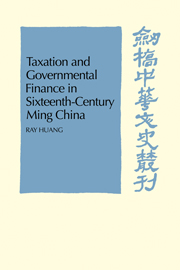Book contents
- Frontmatter
- Contents
- List of figures
- List of tables
- Preface by D. C. Twitchett
- Acknowledgements
- A note on weights and measures
- The Ming emperors
- Map of Ming provinces
- 1 Fiscal organization and general practices
- 2 The heritage of the sixteenth century and major fiscal problems
- 3 The land tax—(i) Tax structure
- 4 The land tax—(ii) Tax administration
- 5 The salt monopoly
- 6 Miscellaneous incomes
- 7 Financial management
- 8 Concluding observations
- List of abbreviations
- Appendixes
- Notes to the text
- Bibliography
- Glossary index
- General index
- Frontmatter
- Contents
- List of figures
- List of tables
- Preface by D. C. Twitchett
- Acknowledgements
- A note on weights and measures
- The Ming emperors
- Map of Ming provinces
- 1 Fiscal organization and general practices
- 2 The heritage of the sixteenth century and major fiscal problems
- 3 The land tax—(i) Tax structure
- 4 The land tax—(ii) Tax administration
- 5 The salt monopoly
- 6 Miscellaneous incomes
- 7 Financial management
- 8 Concluding observations
- List of abbreviations
- Appendixes
- Notes to the text
- Bibliography
- Glossary index
- General index
Summary
It was perhaps in its management of the salt monopoly that the Ming government demonstrated most clearly its ineptitude in business administration. The monopoly system was not expandable and for most of the sixteenth century and early seventeenth century its projected income stagnated at a fixed level. Even the price schedule, settled in 1535, was rarely revised thereafter. The administrators of the monopoly never knew how much of its revenue was derived from the excise tax and how much from governmental control over production.
The major weakness of the monopoly was that it applied the methods and principles suitable for governing a crude agrarian society to the management of an ambitious business enterprise. Owing to the incompetence of its administrators the system proliferated into numerous subsystems with the result that the single commodity involved, salt, was divided for administrative purposes into seven or eight different categories. Even in the sixteenth century the periodic failures of the monopoly's operations appeared in some respects to resemble modern business cycles.
The incompetence was not entirely due to ignorance, however. In the sixteenth century, and even in the late fifteenth century, several Ming statesmen had pointed out the inadequacies of the system and suggested possible remedies. These suggestions were entirely ignored, for the salt administration was only one element in the fiscal system which continued, according to Liang Fang-chung, to be patterned on ‘the Hung-wu model’. Its limited capacity and lack of adaptability made any general reform virtually impossible.
- Type
- Chapter
- Information
- Publisher: Cambridge University PressPrint publication year: 1975



